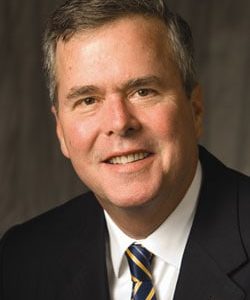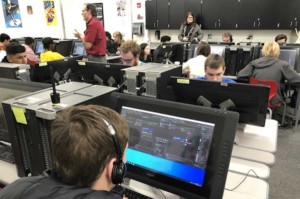Jeb Bush: A Real Shot at Quality at Scale
 Jeb Bush supports digital learning “Because it’s the best chance we have to promote rising student achievement at the most rapid rate possible.”
Jeb Bush supports digital learning “Because it’s the best chance we have to promote rising student achievement at the most rapid rate possible.”
Bush delivered a rousing lunch speech at Philanthropy Roundtable’s Technology & the Shift to Student-Centric Learning conference.
Former Florida Governor Bush enumerated the unacceptable results of the current education system and pointed to 3 million open jobs that could be filled by a skilled workforce.
As Governor, Jeb learned to ask a tough question, “If you weren’t doing it this way, how would you do it?” When it comes to pubic education, his answer includes six elements of a world-class system:
1.World-class standards. States must set high standards like Common Core does for math and English. Technology won’t change what students learn but how. It will help address a pervasive high school problem—boredom.
2.Online assessment. You measure what you treasure. Measuring achievement against world class standards using online assessment will give teachers more data, it will shorten the time between identifying and solving a problem, it will encourage more time teaching less time testing, it will help ensure that each student gets the support them need to succeed.
3.Data-driven accountability. We need to hold schools accountable for results. When you grade schools, the system aligns its interest with achievement. Technology provides real time feedback for teachers, principals, and system heads.
4.Effective teachers. Technology cannot replace teachers. Instead, it will expand reach of an effective teachers. It will help improve access to great teachers for all student, particularly those in hard to staff subjects and areas.
5.Funding based on mastering skills not dates. We need to stop spending money based on time and place, and move to results. Seat time and count days were organizing principles of an agrarian 19th century. Funding should promote performance, completion, and innovation.
6.Full choice of schools and courses. State policy should enable customized education, anywhere, anytime, learning—each student on their own path. Dual enrollment (a course taken for both college and high school credit) is area of great opportunity.
Bush suggested that full choice and portable performance-based funding will enable quality at scale. “The idea of scalability is a good thing, not a bad thing; you can have higher quality with scale.”
Jeb said there are some areas, like assessment, where more R&D investment would be helpful. But he made it clear that we can’t just keep adding cost to the system that we have. He sees technology as a “Catalyst for transformation from adult-driven system to student-centered performance-base system that works for all students and families.” He added that, “We need to move away from a focus on districts to a focus on students.”
He said “Florida Virtual School is a spectacular school but it will be challenged by new virtual and blended schools.” He’s less optimistic about teacher preparation and said, “Schools of education keep stinking up the place by replicating the old system.”
Moderator Checker Finn pressed Bush on quality control and Jeb replied, “I’m not really interested in control,” and added, “We should avoid over regulation; great things happen in an explosion of innovation.”
But recall that Bush is a strong accountability advocate. When Finn pressed about low level credit recovery courses, Bush replied, “Students should take the same end-of-course-exam as everyone else.”
On advise to philanthropists and venture investors, Bush encouraged the audience to find or build a Khan Academy for reading, then science.
Bush is in San Francisco this week hosting his National Summit on Education Reform. With his Digital Learning Now co-chair Bob Wise, Bush will be releasing a detailed assessment of state progress against the 10 Elements of High Quality Digital Learning. The Foundation for Excellence in Education will also release a detailed Roadmap for Reform, a guide for state policy makers.








0 Comments
Leave a Comment
Your email address will not be published. All fields are required.